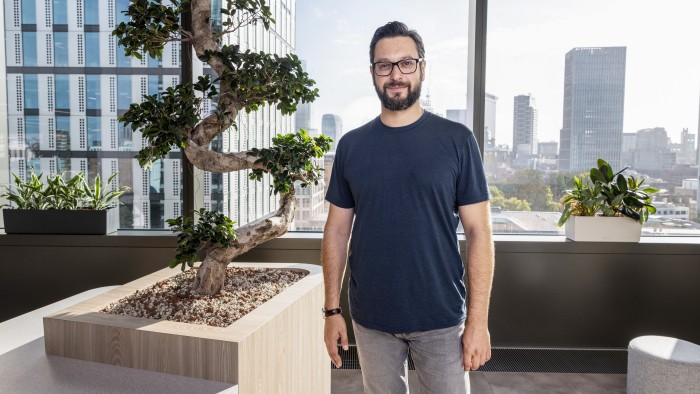Fintech start-up closes trade finance gap for small businesses

Simply sign up to the Financial services myFT Digest -- delivered directly to your inbox.
Greg Karpovsky had a formative experience at university that would inspire the creation of Stenn, an online platform providing working capital to international suppliers. He was studying at Moscow State in the 1990s when Jack Welch, then chair and chief executive of the conglomerate GE, visited to give a lecture.
The young Karpovsky asked Welch what line of business he should consider — markets were rapidly opening up in eastern Europe and he was already a keen entrepreneur.
Welch’s response was to focus on commercial finance. And that set Karpovsky on his journey to creating Stenn.
His first venture, Eurokommerz, focused on providing working capital to small companies serving mainly domestic trade in eastern Europe. But Karpovsky had global ambitions. After exiting Eurokommerz, and following other projects, he used his own capital to set up Stenn in 2015.
Karpovsky’s aim was to offer cash through digital channels to small businesses trading goods on an international scale, but lacking banking support.
“We saw there is a very large market of small businesses engaged in international trade and the digital economy who are dramatically underserved by the banks,” he says.
“I learned there was an opportunity more than 20 years ago, so I started solving this issue in local markets. I’m now trying to grow this idea on a global scale.”
The need for trade finance remains pressing. The gap in international trade credit amounts to $3tn and is widening, according to the World Bank. A report by consultants Accenture, commissioned by Stenn, estimates the demand for trade finance will hit $6.1tn in the next four years.
But the provision of finance to smaller businesses is lagging behind — a problem exacerbated by the global financial crisis in 2008, which made large banks pull back from lending more broadly.
Recently, supply chains have also come under pressure, hitting small supplier companies. The Covid-19 pandemic and the war in Ukraine have restricted the movement of goods globally, compounding the problem of suppliers receiving payments on time.

Stenn is working to address this issue. It aims to connect small and medium-sized businesses around the world to developed capital markets. Through its proprietary technology, Stenn can process applications for trade finance in as little as 48 hours, in more than 70 countries.
It is backed by large global financial institutions, including HSBC and Barclays, but focuses on businesses in need of financing and trade credit protection in the range of $10,000 to $10mn. To date, Stenn has facilitated some $10bn of financing in total.
“We realised a lot of goods are being bought from emerging markets, such as China, India and Latin America, so we started meeting with suppliers in these countries and we saw how dramatically they were underbanked,” Karpovsky explains.
“Many of these suppliers are serving business in mature markets, for example the US and western Europe. But they are also selling directly to the end customer in those markets.”
Although Stenn provides a range of financing options, its bread and butter is invoice finance: advancing payments to suppliers immediately and collecting from their customers later, in return for a fee. Its service enables suppliers to be paid as soon as their goods are shipped, while allowing the buyers to receive their products and generate some revenue from them before they have to settle the bill.
Without invoice finance, suppliers could end up waiting months for payment when they export goods to buyers overseas, which can harm their cash flow and growth.
In return, Stenn takes a fee from the supplier of between 0.65 per cent and 4 per cent of the invoice value, and also takes on the risk of a buyer defaulting.
Unlike many other providers of invoice finance, however, Stenn offers larger loans. “This company is doing it at a large scale, up to $10mn invoices, which is pretty impressive,” says David Brear, chief executive of fintech consultancy 11:FS.
“In this market, given the cash flow situation, I think there are going to be people queueing up for this service,” he adds. “The pressures that those midsized growing SMEs are facing [are] scary. I can only see Stenn clearing up in that space. So, if it’s got a big enough book from a lending perspective, this is pretty low-risk when it comes to invoice financing. It’s a bit of a blue ocean for them given the lack of competition at this scale.”
Although banks offer trade finance, their approval processes tend to take longer than the 48 hours offered by Stenn. “The banks, in various guises, do some of this, but they make people jump through a lot of hoops,” notes Brear. Shane Burgess, of venture capital fund Stripe, an adviser to Karpovsky, says Stenn is “democratising access” to working capital for entrepreneurs in the emerging markets.
“Karpovsky shaped his view of the world not just by sitting in London, he’s lived in Singapore, he’s gone out to meet merchants in China and other areas of the Far East, and is building a good understanding of their pain point.”
At the heart of Stenn’s competitive offering is its technology. “What we’re selling investors is risk management,” says Karpovsky. “We can onboard customers, credit assess, manage client risks — that is what our technology is designed to do.
“We are a technology company focused on managing risks, credit, fraud and compliance. We call it ‘de-risking’ for banks . . . 50 per cent of [our] people are computer engineers, which has allowed us to scale fast.”
He says Stenn’s technology allows the company to “source and efficiently onboard customers online, as well as to risk-assess and verify transactions digitally”.
Larry Illg, of venture capital firm Naspers and a non-executive director on the board of Stenn, sees it meeting a need in emerging nations. “Western capital won’t fund the developing world because they, frankly, misprice the risk,” he argues. “Karpovsky is trying to help bridge the gap [and] bring western capital to the developing world; he’s built technology that can better price risk.”
Earlier this year, Stenn raised $50mn from private equity firm Centerbridge, giving the company a $900mn valuation and putting it on track to become a “unicorn”, as $1bn start-ups are dubbed.
Even the Covid-19 pandemic has been an opportunity for Stenn. “What we saw during the pandemic, those companies found it even more difficult to access capital from banks,” says Karpovsky. Later-stage co-founder and group chief financial officer, Chris Rigby, believes the “perennial benefit” of being able to extend credit terms with buyers was only “accentuated by the pandemic.”
However, it is not a business activity without risks. Or critics. Invoice financing and its dangers came under scrutiny last year, when supply chain finance firm Greensill Capital collapsed. Greensill, which counted former UK prime minister David Cameron among its advisers, was overly exposed to certain customers, some of whom defaulted on their payments.
Stenn is keen to emphasise that it has a different business model. “We never competed with [Greensill]; we never were in its business,” says Karpovsky.
“It was focused on bigger transactions, that were buyer-led. We’re focused on suppliers and small businesses, globally. It was acting like a bank, and was not using technology as we do. So we have a different business model.”
Brear at 11:FS says: “I don’t think Greensill has tainted the industry as a whole. Invoice financing has been around a really long time because of the need for bridging between winning the work and doing the work. For anybody on a smaller scale, cash flow is king.”
Karpovsky is keen to continue expanding. “We will plan new equity rounds, but we’re in a very good position at the moment. We’re profitable, which is almost unique for a young tech company.”
There is no sign of his ambition waning, either. Where does he see the valuation of the company heading? “We are planning to grow about 30 times in the next four-five years,” he says.
Comments